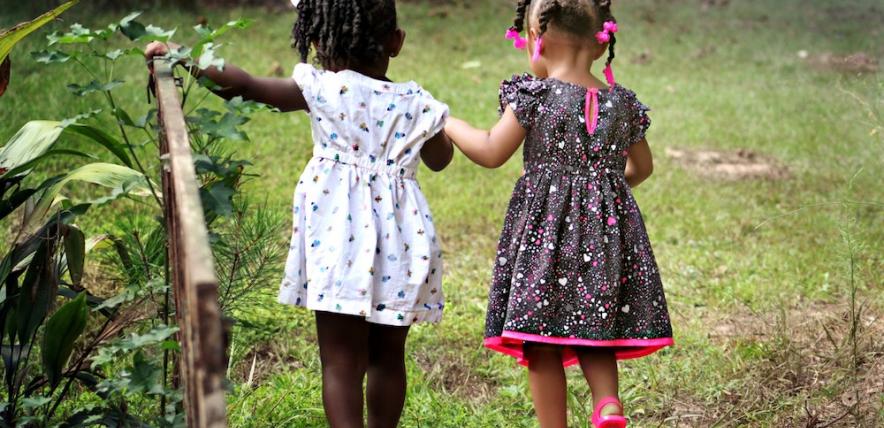As we begin the school year many parents are preparing their little ones for “big school”. One of the things parents begin to think about is how to help their children make and keep their first friends. Older children can also struggle to make and keep friends, but help is at hand.
This article by Elyssa Campbell-Barr has lots of great tips.
“Watching your child go through the ups and downs of friendships is one of the toughest things about being a parent.
We all want our children to be able to make and keep friends; to be liked and likeable. So what can we do to help?
Babies are born sociable; they love company and interaction. By giving them lots of attention, showing affection, making eye contact and talking to them as much as possible from day one, you’ll be helping to develop the social foundations they’ll need to build friendships throughout life.
Be a role model of good friendship yourself. Let your child see how much you enjoy and value the company of your own friends. When you’re out and about, give friendly greetings to people you know, and your child will soon start to imitate. Encourage your little one to develop empathy by discussing their own feelings and those of others, whether people they know or characters in books and films.
Ways to play
Help your child to develop social skills by giving them plenty of opportunities to be sociable. Spend time with friends, attend structured activities such as toddler groups or classes, and give them the chance to interact with children they don’t know at the playground or softplay.
Young children will often make new friends easily, but if your little one seems to struggle give them some strategies to help.
Explain that smiling, making eye contact and saying “hello” can help to break the ice.
Talk about friendly introductory questions they could use: ‘What’s your name?’ ‘Do you want to play?’, ‘Shall we share?’ or ‘Can I join in?’
Children on the autistic spectrum in particular may be reassured by having social rules to follow.
Styles of play
Sometimes kind, polite, sociable parents are shocked to discover they have a toddler who snatches, hits and bites. If this sounds like your offspring, don’t worry! Toddlers’ impulsiveness and lack of self-control means they aren’t capable of relating to one another or forming friendships in the way that older children can.
Knowing how to play and socialise appropriately takes time — it’s simply a learning curve as they develop and mature.
Child development experts have defined five styles of play that children develop between toddlerhood and school age.
You may notice that your child prefers a particular style of play and this may be linked to your child’s developing social and emotional skills, the context and the play activity itself.
Play may be ‘solitary,’ so even when they are with other children, your child may be self-absorbed and play independently.
You may notice ‘onlooker’ play, where your child is interested in what others are doing but won’t join in.
‘Parallel’ play is a third style of play – two children playing alongside each other, doing the same thing but not interacting.
As children’s social, emotional and language skills develop their play may become ‘associative’ – they interact with their peers, playing together but not in a co-ordinated or organised way.
Children need time to develop the skills for ‘co-operative play’ as this requires setting and following their own rules and acting as a team.
Until a child can communicate, understands about sharing, can negotiate and is willing and able to take their turn they may snatch and squabble.
You can help your child develop the necessary skills by encouraging your young child to share, take turns and be considerate of others’ feelings. But if they get it wrong, try to respond with understanding and patience and model positive ways to share and negotiate.
Planning a successful play date
If you organise a playdate, a little forward planning will help to make it a success.
Chat with your child about what the friend might like to do. Think carefully about the toys which will be available and those special toys that your child prefers not to share are best put out of sight.
The best playdate activities involve co-operation and put the children on an equal footing.
Try construction toys, craft activities, junk-modelling, baking, a play-tent, sand or water play, music and dancing, or a nature walk.
Keep the first session short – an hour is plenty for young children.
Around one in four UK youngsters is growing up as an only child – more than in any previous generation.
Today’s children also have fewer opportunities for free play with their peers than in the past.
So, as parents, we have a bigger role in helping them form and sustain friendships.
If you think your child may need additional support, discuss your concerns with a professional, such as their teacher or health visitor.
However, remember that no two children are identical, some are sociable and love the company of other children whilst some children, even if they have well-developed social and language skills, prefer their own company.
Children also have their own unique pattern of development so your shy toddler may become a surprisingly sociable child.
As a parent it is important to take the child’s lead and support them as they develop the range of complex skills needed to make and maintain friendships.”
Book Trust has lots of great books about friendships for you to share with your children, many of which you may be able to find in your local library.
You can also read our recent blog post by the Lewisham Educational Psychologist Team on the importance of communication skills with some videos by our EYP teams.



